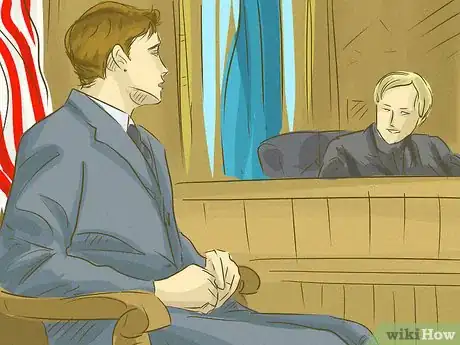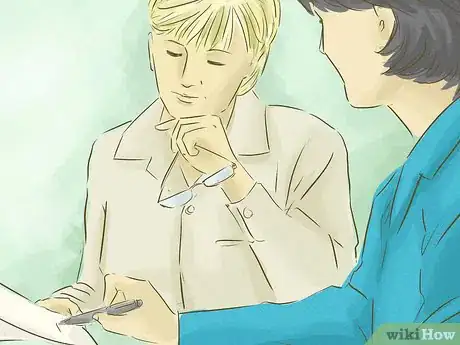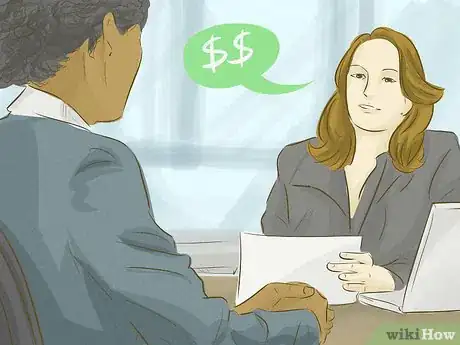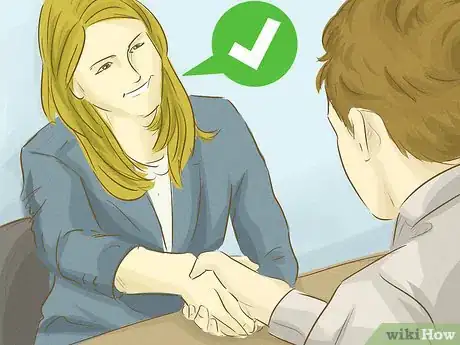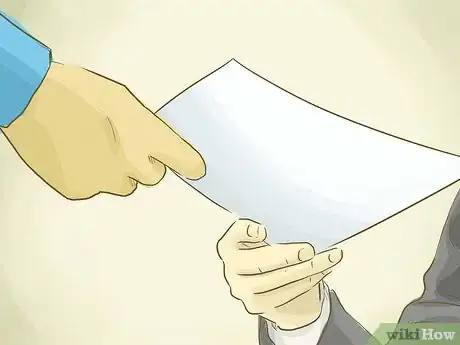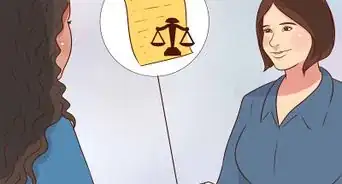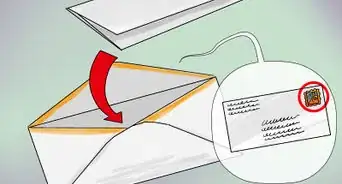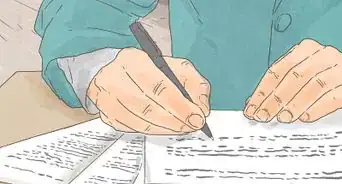This article was co-authored by Clinton M. Sandvick, JD, PhD. Clinton M. Sandvick worked as a civil litigator in California for over 7 years. He received his JD from the University of Wisconsin-Madison in 1998 and his PhD in American History from the University of Oregon in 2013.
There are 8 references cited in this article, which can be found at the bottom of the page.
This article has been viewed 46,200 times.
In the U.S., if you are charged with a crime and cannot afford to pay for a private defense lawyer, the court will appoint a public defender (or, depending on the jurisdiction’s practice, a panel attorney) to represent you. The right to defense counsel is guaranteed in the Sixth Amendment to the United States Constitution.[1] Furthermore, the police should have given you a verbal reminder of your right to an attorney at the time of your arrest or prior to any interrogation.[2] To get a public defender, you usually need only ask the court to appoint one. However, you may be required to submit evidence of your financial situation.[3]
Steps
Assessing Your Circumstances
-
1Review your case. You are typically only entitled to a public defender if you are being charged with a crime for which you could be sentenced to jail time if convicted.[4] For some minor infractions like traffic tickets, the law does not guarantee you the right to be represented by counsel.
- There are other types of cases where you could stand to have substantial rights taken from you, such as an action by Child Protective Services to have your parental rights terminated. In such cases, although they are not criminal proceedings, you may be entitled to a public defender. Public defenders are also sometimes appointed to represent the mentally incapacitated.
-
2Assess your finances. You will not be eligible for a public defender unless you cannot afford a private defense lawyer. At the time of your request, you can expect the court to inquire into your finances. The judge may even require evidence of economic hardship for you or your family.[5] If you lose your case, you will have to pay the public defender’s fees, which will be less than those of a private defense attorney. If you win, you will not owe anything, unless you only qualified for a public defender by lying to the court about your finances.
- Evidence of your financial situation might include recent paystubs, bank and credit statements, and any lease or mortgage paperwork you might have.
- You have no obligation to borrow money or ask your relatives to hire an attorney for you.[6]
- Your request may be denied if your case is simple and not likely to require many hours of work. The judge may instead instruct you to hire a private lawyer instead.[7]
Advertisement -
3Understand the value of a public defender. Some defendants decide to represent themselves, which is extremely risky, given the complexities of criminal law and the prospect of facing an experienced prosecutor.[8] A public defender has experience in the writing, negotiating, and trial work required to put on your case.
- If you plan to plead guilty, you should still have an attorney negotiate a more favorable sentence or plea deal for you. The majority of cases are resolved by a negotiated plea bargain.
Requesting A Public Defender
-
1Attend the first hearing. Your first court appearance is usually your arraignment or your bail hearing. The judge will ask if you are have an attorney and whether you would like a public defender to be appointed for you.[9] Jail officials will take you to the hearing if you are in custody. If you are already out on bail, you will need to make sure you attend the hearing yourself.
-
2Request a public defender. The judge will ask whether you have an attorney to represent you and whether you would like a public defender appointed to defend you. If a public defender is appointed immediately, he or she will represent you during the remainder of the hearing.[10]
- The judge might postpone the hearing to review your economic circumstances before appointed a public defender.[11] Answer the judge’s questions and provide any evidence of your financial situation he or she asks for.
-
3Know the difference between a panel attorney and a public defender. In some counties, courts use “panel attorneys” in instead of or in addition to public defenders. Public defenders are government attorneys who work for the Public Defender’s office. Panel attorneys are private criminal defense attorneys who accept court-appointed defense assignments to supplement their regular law practice.[12]
- If your county has a Public Defender’s office, you may still receive a panel attorney if there is a conflict of interest that prohibits the public defender from representing you.[13]
-
4Work with your attorney. Be sure to note the name and phone number of your public defender. If you are incarcerated, your attorney will meet with you. If you are out on bail, be sure to return the attorney’s calls and cooperate with his or her requests. You can help the attorney by providing a list of witnesses, a timeline of relevant events, or even drawing a picture of the crime scene to demonstrate where the important people and objects were located.[14]
- With some narrow exceptions, all of your communications with the public defender are confidential and protected by attorney-client privilege.[15]
-
5Report any changes in your economic status. If your economic status changes, you need to inform the court or risk being penalized for failing to do so. If your status improves, you may be required to pay the public defender for his or her work. Have your attorney help you inform the court of any changes.
-
6Change attorneys if necessary. You can request a new public defender if you believe that your attorney has done poor work on your case, though such requests are rarely granted by judges. TO get a substitution of attorney, you will need to establish that there has been a breakdown in communication between you and the public defender.[16]
- If your public defender will voluntarily withdraw, the judge will be more likely to grant the attorney’s request for a substitution. Talk to your public defender about changing attorneys.[17]
- File for a substitution if your attorney will not withdraw. Ask the clerk what forms you need to submit to file a Motion for Substitution of Attorney.
- If your trial date is coming up soon, the judge will be less likely to grant your request, since a new attorney would be unable to prepare the case in a short amount of time without an extension.[18]
Appealing a Denial
-
1Review your finances again. You might have been denied a public defender if the court determined that you can afford to hire your own attorney. Review the information you gave the judge and make sure it was accurate, or identify any piece of information that is incorrect.
-
2Locate the necessary forms. The forms you will need to file vary from state to state and county to county. Ask the court clerk what forms you need to complete to file an appeal of the court’s decision to deny you a public defender.
-
3Submit your appeal paperwork. Bring your completed forms to the clerk’s office to file your appeal. Attach any supporting documents asked for in the instructions on the forms. After you submit your appeal, wait for the court to mail you a copy of the decision.
- Watch the deadlines. There will be a deadline to file your appeal, which should be included in the initial denial of your request for a public defender, if you received your denial by mail. The window of time to file an appeal may be very short. For example, the deadline passes after only three days in Alaska.
Warnings
- This article is intended as legal information and does not provide legal advice. If you need legal advice, contact a licensed attorney.⧼thumbs_response⧽
References
- ↑ http://constitution.findlaw.com/amendment6.html
- ↑ http://criminal.findlaw.com/criminal-legal-help/how-to-obtain-a-court-appointed-defense-lawyer.html
- ↑ http://criminal.findlaw.com/criminal-legal-help/how-to-obtain-a-court-appointed-defense-lawyer.html
- ↑ http://www.nolo.com/legal-encyclopedia/defendants-rights-during-court-trial-29793.html
- ↑ http://www.criminaldefenselawyer.com/resources/criminal-defense-case/using-court-appointed-lawyer.htm
- ↑ http://www.criminaldefenselawyer.com/resources/criminal-defense-case/using-court-appointed-lawyer.htm
- ↑ http://www.criminaldefenselawyer.com/resources/criminal-defense-case/using-court-appointed-lawyer.htm
- ↑ https://www.osbar.org/public/legalinfo/1078_RightToAttorney.htm
- ↑ http://www.nolo.com/legal-encyclopedia/criminal-defense-lawyer-faq-29055-2.html
- ↑ http://www.nolo.com/legal-encyclopedia/criminal-defense-lawyer-faq-29055-2.html
- ↑ http://www.nolo.com/legal-encyclopedia/criminal-defense-lawyer-faq-29055-2.html
- ↑ http://www.criminaldefenselawyer.com/resources/criminal-defense-case/using-court-appointed-lawyer.htm
- ↑ http://www.criminaldefenselawyer.com/resources/criminal-defense-case/using-court-appointed-lawyer.htm
- ↑ http://criminal.lawyers.com/criminal-law-basics/working-with-a-public-defender-or-court-appointed-attorney.html
- ↑ http://criminal.lawyers.com/criminal-law-basics/working-with-a-public-defender-or-court-appointed-attorney.html
- ↑ http://www.criminaldefenselawyer.com/resources/criminal-defense-case/using-court-appointed-lawyer2.htm
- ↑ http://www.criminaldefenselawyer.com/resources/criminal-defense-case/using-court-appointed-lawyer2.htm
- ↑ http://criminal.lawyers.com/criminal-law-basics/working-with-a-public-defender-or-court-appointed-attorney.html
About This Article
If you’re charged with a crime and cannot afford a lawyer, the court will appoint you a public defender. In some cases, you’ll need to prove your financial situation to the judge. For example, they may ask for a recent paystub, a bank statement, or mortgage paperwork. At your first hearing, the judge will ask you if you would like a public defender appointed to you. Then, they may need time to review your financial status before approving your request. To learn how to appeal if you’ve been denied a public defender, read more from our Legal co-author.



